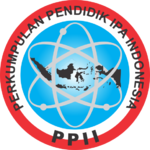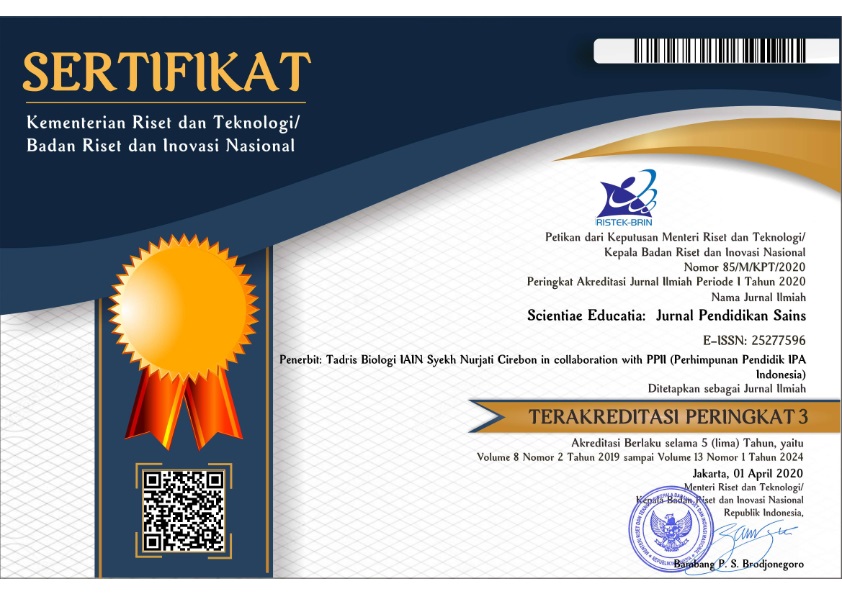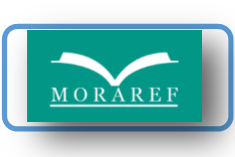Profile of Junior High School Students' Critical Thinking Skills in Answering Questions Related to Biological Concepts
(1) Universitas Muhammadiyah Malang
(*) Corresponding Author
Abstract
There are indication that the implementation of education in various places in Indonesia is still not optimally empowering students' critical thinking skills (CTS). The aimed of this quantitative study was about 1) to survey the CTS of junior high school students in the Malang, and 2) to know whether or not there were differences in CTS between students in different grades. The measurement of CTS in this study used an integrated critical thinking assessment of the essay test. Mean score and one-way ANOVA were used as data analysis techniques. The results concluded that 1) students’ CTS in Malang were still low; and 2) there was no significant difference in the level of CTS between students of class VII, VIII, and IX.
Keywords
Full Text:
PDFReferences
Abrami, P. C., Bernard, R. M., Borokhovski, E., Waddington, D. I., Wade, C. A., & Persson, T. (2014). Strategies for teaching students to think critically: A meta-analysis. Review of Educational Research, 20(10), 1–40. https://doi.org/10.3102/0034654314551063
Ali, S. A. (2016). Critical thinking in the information age : helping students find and evaluate scientific information. Teaching Innovation Projects, 6(1). Retrieved from http://ir.lib.uwo.ca/tips/vol6/iss1/3%0AThis
Almroth, B. C. (2015). The importance of laboratory exercises in biology teaching ; case study in an ecotoxicology course. Pedagogical Development And Interactive Learning, (september), 1–11.
Amin, A. M., Corebima, A. D., Zubaidah, S., & Mahanal, S. (2017). The critical thinking skills profile of preservice biology teachers in Animal Physiology. In Proceedings of the 3rd International Conference on Education and Training (ICET 2017) (Vol. 128, pp. 179–183). https://doi.org/10.2991/icet-17.2017.30
As’ari, A. R., Mahmudi, A., & Nuerlaelah, E. (2017). Our prospective mathematic teachers are not critical thinkers yet. Journal on Mathematics Education, 8(2), 145–156. https://doi.org/10.22342/jme.8.2.3961.145-156
Bethel, E. C., Bernard, R. M., Abrami, P. C., & Wade, C. A. (2018). A systematic review of the effects of learning environments on student learning outcomes. Melbourne. Retrieved from http://www.iletc.com.au/wp-content/uploads/2018/07/TR4_Web.pdf
Binkley, M., Erstad, O., Herman, J., Raizen, S., Ripley, M., Miller-Ricci, M., & Rumble, M. (2012). Defining twenty-first century skills. In P. Griffin, B. McGaw, & E. Care (Eds.), Assessment and teaching of 21st century skills (pp. 17–66). Dordrecht: Springer. https://doi.org/10.1007/978-94-007-2324-5
Çimer, A. (2012). What makes biology learning difficult and effective: Students’ views. Educational Research and Reviews, 7(3), 61–71. https://doi.org/10.5897/ERR11.205
Crowley, Ú. (2015). Review of critical thinking skills. AISHE, 7(3), 2641–2645. Retrieved from http://ojs.aishe.org/index.php/aishe-j/article/download/264/361
Donald, G. M. (2012). Teaching critical & analytical thinking in high school biology? The American Biology Teacher, 74(3), 178–181. https://doi.org/10.1525/abt.2012.74.3.9
Dwyer, C. P., Hogan, M. J., & Stewart, I. (2014). An integrated critical thinking framework for the 21st century. Thinking Skills and Creativity, 12, 43–52. https://doi.org/10.1016/j.tsc.2013.12.004
Elisanti, E., Sajidan, S., & Prayitno, B. A. (2018). The profile of critical thinking skill students in XI grade of senior high school. In Proceedings of the 1st Annual International Conference on Mathematics, Science, and Education (ICoMSE 2017). Paris, France: Atlantis Press. https://doi.org/10.2991/icomse-17.2018.36
Etobro, A. B., & Fabinu, O. E. (2017). Students’ perceptions of difficult concepts in Biology in senior secondary schools in Lagos State. Global Journal of Educational Research, 16, 139–147.
Evens, M., Verburgh, A., & Elen, J. (2013). Critical thinking in college freshmen: The impact of secondary and higher education. International Journal of Higher Education, 2(3), 139–151. https://doi.org/10.5430/ijhe.v2n3p139
Fauzi, A. (2018). The development of question instruments to access concepts master, critical thinking, and metacognitive skills. In Prosiding Seminar Nasional IV 2018: Peran Biologi dan Pendidikan Biologi dalam Revolusi Industri 4.0 dan Mendukung Pencapaian Sustainability Development Goals (SDG’s) (pp. 68–75). Malang: Prodi Pendidikan Biologi FKIP Universitas Muhammadiyah Malang. Retrieved from http://research-report.umm.ac.id/index.php/psnpb/article/view/2524/2358
Hadi, S., Retnawati, H., Munadi, S., Apino, E., & Wulandari, N. F. (2018). The difficulties of high school students in solving higher-order thinking skills problems. Problem of Education in the 21st Century, 76(4), 520-532. Retrieved from http://oaji.net/articles/2017/457-1533495738.pdf
Hasibuan, H., & Djulia, E. (2017). Analisis kesulitan belajar siswa pada materi virus di kelas X Aliyag Al-Fajri Tanjungbalai tahun pembelajaran 2016/2017. Jurnal Pelita Pendidikan, 4(4), 16–24.
Hasruddin, & Putri, S. E. (2014). Analysis of students’ learning difficulties in fungi subject matter grade X science of Senior high school Medan academic year 2013/2014. International Journal of Education and Research, 2(8), 269–276. Retrieved from https://www.ijern.com/journal/2014/August-2014/25.pdf
Heijltjes, A. (2010). Cultivating critical thinking: The effects of instructions on economics students’ reasoning. Hertogenbosch: Uitgeverij BOXPress. Retrieved from http://www.gvsu.edu/cms3/assets/B78A66C2-A774-13A2-78CDCF13A1345FC3/2010fallteachingconference/ftcrenerpresentatio1353019.pdf
Irawan, T. A., Rahardjo, S. B., & Sarwanto. (2017). Analysis of secondary school students’ critical thinking skill in learning energy in living system. Pancaran Pendidikan, 6(4), 1–8. https://doi.org/10.25037/pancaran.v6i3.78
Lai, E. (2011). Motivation: A literature review. Alwasy Learning. Retrieved from http://www.datec.org.uk/CHAT/chatmeta1.htm
Lai, E. R. (2011). Critical thinking: A literature review. Critical Thinking, 5–12. https://doi.org/10.2307/3069464
Learning Metrics Task Force. (2013). Toward universal learning: Recommendations from the Learning Metrics Task Force. Washington, D. C.: UNESCO Institute for Statistics and Center for Universal Education at the Brookings Institution. Retrieved from https://www.brookings.edu/wp-content/uploads/2016/06/LTMF-RecommendationsReportfinalweb.pdf
Levin-Goldberg, J. (2012). Teaching generation TechX with the 4Cs : Using technology to integrate 21st century skills. Journal of Instructional Research, 1, 59–66. Retrieved from https://files.eric.ed.gov/fulltext/EJ1127608.pdf
Melati, P. P. (2016). Analisis kesulitan belajar siswa pada maeri sel di kelas XI SMA Negeri 1 Rasau Jaya. Universitas Muhammadiyah Pontianak. Retrieved from http://repository.unmuhpnk.ac.id/552/1/PUTRI_PAJAR_MELATI.pdf
Moser, D. (2017). Driving 21st century learning. Open Online Journal for Research and Education, (December), 115–125. Retrieved from https://journal.ph-noe.ac.at/index.php/resource/article/download/516/499
Murray-Nseula, M. (2011). Incorporating case studies into an undergraduate genetics course. Journal of the Scholarship of Teaching and Learning, 11(3), 75–85.
Netri, N., Holiwarni, B., & Abdullah. (2018). Development of test instruments based higher order thinking skill (HOTS) on chemical equilibrium at second grade in senior high school. JOM, 5(2), 1–11. Retrieved from https://jom.unri.ac.id/index.php/JOMFKIP/article/download/20515/19843
Oliveira, L. B. de, DÃaz, L. J. R., Carbogim, F. da C., Baldacin, A. R., Rodrigues, & Püschel, V. A. de A. (2016). Effectiveness of teaching strategies on the development of critical thinking in undergraduate nursing students: a meta-analysis Effectiveness of teaching strategies on the development of critical thinking in undergraduate nursing students: a meta-analysis. Rev Esc Enferm USP •, 50(2), 350–359. https://doi.org/10.1590/S0080-623420160000200023
Persky, A. M., Medina, M. S., & Castleberry, A. N. (2018). A review of developing critical thinking skills in pharmacy students. American Journal of Pharmaceutical Education. https://doi.org/10.5688/ajpe7033
Ramdiah, S., Abidinsyah, Royani, M., & Husamah. (2019). Understanding, planning, and implementation of HOTS by senior high school biology teachers in Banjarmasin-Indonesia. International Journal of Instruction, 12(1). Retrieved from http://www.e-iji.net/dosyalar/iji_2019_1_28.pdf
Retnawati, H., Djidu, H., Kartianom, K., Apino, E., & Anazifa, R. D. (2018). Teachers’ knowledge about higher-order thinking skills and its learning strategy. Problem of Education in the 21st Century, 76(2), 215–230. Retrieved from http://oaji.net/articles/2017/457-1524597598.pdf
Santika, A. R., Purwianingsih, W., & Nuraeni, E. (2018). Analysis of students critical thinking skills in socio-scientific issues of biodiversity subject. In Journal of Physics: Conference Series (Vol. 1013). IOP Publishing. https://doi.org/10.1088/1742-6596/1013/1/012004
Schmaltz, R. M., Jansen, E., & Wenckowski, N. (2017). Redefining critical thinking: Teaching students to think like scientists. Frontiers in Psychology, 8(MAR), 2015–2018. https://doi.org/10.3389/fpsyg.2017.00459
Scott, C. L. (2015). The futures of learning 2: What kind of learning for the 21st century? Education Research and Foresight. Paris. Retrieved from https://www.researchgate.net/profile/Dickson_Adom/post/How_to_develop_self_learning_skills_techniques_and_processes/attachment/5a8fa082b53d2f0bba53ba01/AS%3A597062399840261%401519362177920/download/242996e.pdf
Sharma, D., & Sharma, S. (2018). Relationship between motivation and academic achievement. International Journal of Advances in Scientific Research, 4(1), 1–5. https://doi.org/10.7439/ijasr
Slamet, A., Tapilouw, F. sudargo, Rohman, I., & Adianto. (2014). Critical thinking ability analysis beginning teacher candidates of biology in the animal physiology material At Biology Education Program FKIP Sriwijaya University, 3(7), 1038–1042. Retrieved from https://pdfs.semanticscholar.org/0189/6fc3bb425854bbefc9ce41001f091aaa9b7c.pdf
Slameto. (2014). Developing critical thinking skills through school teacher training “training and development personnel†model and their determinants of success. International Journal of Information and Education Technology, 4(2), 161–166. https://doi.org/10.7763/IJIET.2014.V4.390
Sundell, B. (2015). Critical thinking and interdisciplinary development fostering critical thinking in an interdisciplinary wellness coaching academic program. European Scientific Journal, 11(8), 46–59. Retrieved from http://eujournal.org/index.php/esj/article/viewFile/5254/5065
Suyamto, J., Masykuri, M., & Sarwanto. (2018). An analysis of the initial profile of students` critical thinking skills in learning circulator system at XI Grader of SMA N 1 Gondang Sragen. In Advances in Social Science, Education and Humanities Research (ASSEHR) (Vol. 267, pp. 53–57). Retrieved from https://download.atlantis-press.com/article/55908976.pdf
Tekkaya, C., Ozkan, O., & Sungur, S. (2001). Biology concepts perceived as difficult by turkish high school students. Journal of Education 21, 21, 145–150. Retrieved from http://www.efdergi.hacettepe.edu.tr/200121CEREN TEKKAYA.pdf
Utami, B., Saputro, S., Ashadi, A., Masykuri, M., Probosari, R. M., & Sutanto, A. (2018). Students’ critical thinking skills profile: Constructing best strategy in teaching chemistry. IJPTE : International Journal of Pedagogy and Teacher Education, 2(January), 63. https://doi.org/10.20961/ijpte.v2i0.19768
Wang, X., & Zheng, H. (2016). Reasoning critical thinking: Is it born or made? Theory and Practice in Language Studies, 6(6), 1323. https://doi.org/10.17507/tpls.0606.25
Yates, T. B., & Marek, E. a. (2014). Teachers teaching misconceptions: a study of factors contributing to high school biology students’ acquisition of biological evolution-related misconceptions. Evolution: Education and Outreach, 7, 7. https://doi.org/10.1186/s12052-014-0007-2
ŽivkoviĿ, S. (2016). A Model of critical thinking as an important attribute for success in the 21st century. In Procedia - Social and Behavioral Sciences (Vol. 232, pp. 102–108). Antalya: Elsevier. https://doi.org/10.1016/j.sbspro.2016.10.034
Zubaidah, S., Corebima, A. D., & Mistianah. (2015). Asesmen berpikir kritis terintegrasi tes essay. In Symbion: Symposium on Biology Education (pp. 200–213). Jogjakarta: Universitas Ahmad Dahlan. Retrieved from https://drive.google.com/file/d/0B4keDkb86kWpd0xRTjFlYVBjcEE/view
DOI: 10.24235/sc.educatia.v8i1.4081
Article Metrics
Abstract view : 375 timesPDF - 226 times
Refbacks
- There are currently no refbacks.
Scientiae Educatia: Jurnal Pendidikan Sains indexed by:

This work is licensed under a Creative Commons Attribution 4.0 International License.
Stat Counter (Link)



1.png)












